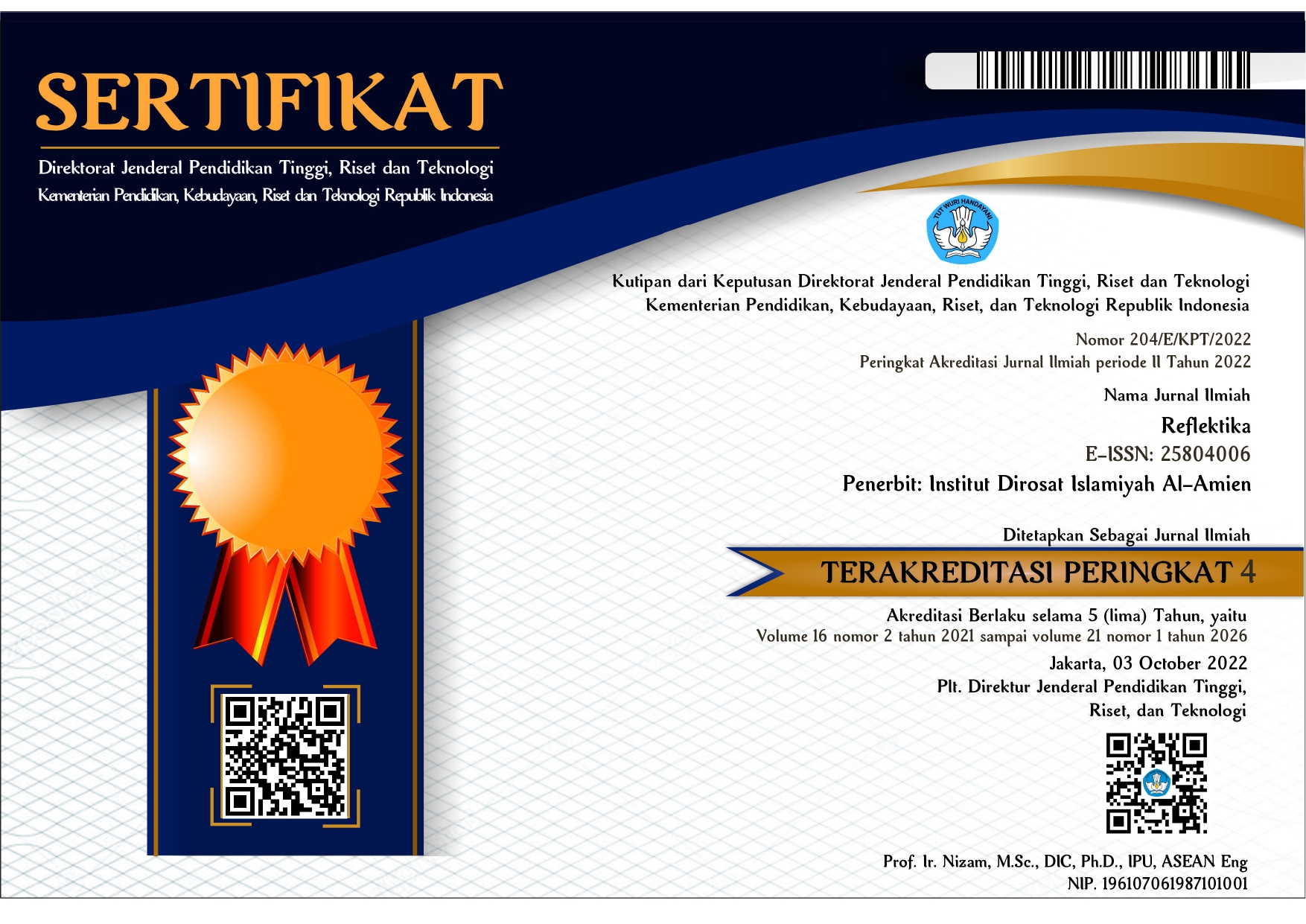STUDENTS’ PERCEPTION AUTHENTIC ASSESSMENT IN EXPLORING EFL READING CLASS
Abstract
Self-assessment is one of the approaches to evaluate students’ reading skill in English. Through this test, students are permitted to find, know, and increase their reading skill. Reading is a challenging subject for many EFL students. They face various difficulties such as language barriers and lack of exposure to critically analyse the materials. This study aims to identify the students’ responses when they are asked to read in English. Further, a qualitative approach is applied, and data are collected from interview. The result of the study, students gradually respond favourably to the use of authentic assessment. They reveal that authentic assessment (1) motivates them to develop a reading routine so that they can learn more vocabulary and become more comfortable with English discourse, (2) aims to train them to exemplify their reading comprehension in more constructively such as writing reviews, presentations, and discussions, and (3) assists them in evaluating their own reading performance. In conclusion, most students admit that authentic assessment aids them in enjoying reading through a series of social practices, in this case, the use of authentic assessment components such as portfolios, performance assessment, and self-assessment.
Keywords
References
Abidin, Yunus, ‘Model Penilaian Otentik Dalam Pembelajaran Membaca Pemahaman Beroreintasi Pendidikan Karakter’, Jurnal Pendidikan Karakter, 0.2 (2012), 164–78
Aziz, Muhammad Noor Abdul, Nurahimah Mohd Yusoff, and Mohd Faiz Mohd Yaakob, ‘Challenges in Using Authentic Assessment in 21st Century ESL Classrooms’, International Journal of Evaluation and Research in Education, 9.3 (2020), 759–68
Creswell, John W. & Creswell, J. David, Research Design Qualitative, Quantitative, and Mixed Methods Approaches, SAGE Publishing, 2018, LXVI
Dellicarpini, Margo, and Counci, ‘Success with ELLs: Authentic Assessment for ELLs in the ELA Classroom’, National Council of Teachers of English, 98.5 (2009), 116–19
Feldman, Kenneth A, ‘Identifying Exemplentary Teachers and Teaching’, Evidence from Student Ratings, 2007, 1–51
French, Dan, ‘A New Vision of Authentic Assessment to Overcome the Flaws in High Stakes Testing’, Middle School Journal, 35.1 (2003), 14–23
Ibrahim, Noraini, Azliza Haniem Abdul Aziz, and Radha M.K. Nambiar, ‘What Master Teachers Do: A Case Study of Planning, Facilitating, Role Modelling and Developing Materials’, International Education Studies, 6.6 (2013), 86–94
Idham, Fauzan Islami, ‘THE USE OF AUTHENTIC ASSESSMENT IN ENGLISH WRITING SKILL’, 3.1 (2015), 1–13
J. Michael O’Malley, Lorraine Valdez Pierce, Authentic Assessment for English Language Learners: Practical Approaches for Teachers (New York: Addison-Wesley Publishing, 1996)
Krismanto, Wawan, Abdul Halik, and Sayidiman Sayidiman, ‘Meningkatkan Kemampuan Membaca Pemahaman Melalui Metode Survey, Question, Read, Recite, Review (Sq3R) Pada Siswa Kelas Iv Sd Negeri 46 Parepare’, Publikasi Pendidikan, 5.3 (2015)
Liu, Shujie, Jared Keeley, and William Buskist, ‘Chinese College Students’ Perceptions of Characteristics of Excellent Teachers’, Teaching of Psychology, 42.1 (2015), 83–86
Majid, Abdul, Penilaian Autentik Proses Dan Hasil Belajar (PT REMAJA ROSDAKARYA, 2020)
Oko, T., Review of Interviewing as Qualitative Research: A Guide for Researchers in Education and the Social Sciences., Contemporary Psychology: A Journal of Reviews, 1992, XXXVII
Sani, Ridwan Abdullah, Penilaian Autentik. Jakarta: PT Bumi Aksara. (Jakarta: PT Bumi Aksara., 2016)
Thornton, Holly J., ‘Excellent Teachers Leading the Way: How to Cultivate Teacher Leadership’, Middle School Journal, 41.4 (2010), 36–43
Valeri-Gold, Maria, and et al., ‘Portfolios: Collaborative Authentic Assessment Opportunities for College Developmental Learners’, Journal of Reading, 35.4 (1992), 298–305
Abidin, Yunus, ‘Model Penilaian Otentik Dalam Pembelajaran Membaca Pemahaman Beroreintasi Pendidikan Karakter’, Jurnal Pendidikan Karakter, 0.2 (2012), 164–78
Aziz, Muhammad Noor Abdul, Nurahimah Mohd Yusoff, and Mohd Faiz Mohd Yaakob, ‘Challenges in Using Authentic Assessment in 21st Century ESL Classrooms’, International Journal of Evaluation and Research in Education, 9.3 (2020), 759–68
Creswell, John W. & Creswell, J. David, Research Design Qualitative, Quantitative, and Mixed Methods Approaches, SAGE Publishing, 2018, LXVI
Dellicarpini, Margo, and Counci, ‘Success with ELLs: Authentic Assessment for ELLs in the ELA Classroom’, National Council of Teachers of English, 98.5 (2009), 116–19
Feldman, Kenneth A, ‘Identifying Exemplentary Teachers and Teaching’, Evidence from Student Ratings, 2007, 1–51
French, Dan, ‘A New Vision of Authentic Assessment to Overcome the Flaws in High Stakes Testing’, Middle School Journal, 35.1 (2003), 14–23
Ibrahim, Noraini, Azliza Haniem Abdul Aziz, and Radha M.K. Nambiar, ‘What Master Teachers Do: A Case Study of Planning, Facilitating, Role Modelling and Developing Materials’, International Education Studies, 6.6 (2013), 86–94
Idham, Fauzan Islami, ‘THE USE OF AUTHENTIC ASSESSMENT IN ENGLISH WRITING SKILL’, 3.1 (2015), 1–13
J. Michael O’Malley, Lorraine Valdez Pierce, Authentic Assessment for English Language Learners: Practical Approaches for Teachers (New York: Addison-Wesley Publishing, 1996)
Krismanto, Wawan, Abdul Halik, and Sayidiman Sayidiman, ‘Meningkatkan Kemampuan Membaca Pemahaman Melalui Metode Survey, Question, Read, Recite, Review (Sq3R) Pada Siswa Kelas Iv Sd Negeri 46 Parepare’, Publikasi Pendidikan, 5.3 (2015)
Liu, Shujie, Jared Keeley, and William Buskist, ‘Chinese College Students’ Perceptions of Characteristics of Excellent Teachers’, Teaching of Psychology, 42.1 (2015), 83–86
Majid, Abdul, Penilaian Autentik Proses Dan Hasil Belajar (PT REMAJA ROSDAKARYA, 2020)
Oko, T., Review of Interviewing as Qualitative Research: A Guide for Researchers in Education and the Social Sciences., Contemporary Psychology: A Journal of Reviews, 1992, XXXVII
Sani, Ridwan Abdullah, Penilaian Autentik. Jakarta: PT Bumi Aksara. (Jakarta: PT Bumi Aksara., 2016)
Thornton, Holly J., ‘Excellent Teachers Leading the Way: How to Cultivate Teacher Leadership’, Middle School Journal, 41.4 (2010), 36–43
Valeri-Gold, Maria, and et al., ‘Portfolios: Collaborative Authentic Assessment Opportunities for College Developmental Learners’, Journal of Reading, 35.4 (1992), 298–305
DOI: 10.28944/reflektika.v16i1.569
Refbacks
- There are currently no refbacks.


.png)

